We talk a lot about Off-Grid Living on this site; but for some, the reality of going off-the-grid seems like a dream that they will never quite attain. The realities of life always seem to be in the way.
I often get emails from people asking how someone can actually do it in today’s day and age, or lamenting over all the obstacles they see getting in the way of their dream.
- How will they make money while living off-the-grid?
- How can they live their current lifestyle in an off-grid setting?
- How will they power their home?
- How can they find land that is suitable for building an off-grid home?
For these reasons, I’m going to start highlighting some real-life examples and stories of how people have successfully made the transition into off-grid living. We started with some brief profiles a couple weeks ago, sharing a couple stories from people who are living a mobile off-grid lifestyle. Today we are going to take a deeper dive, as we share the story of one family who decided to take the plunge and are now living their dream.
A family of six who are living off-the-grid in a tiny home
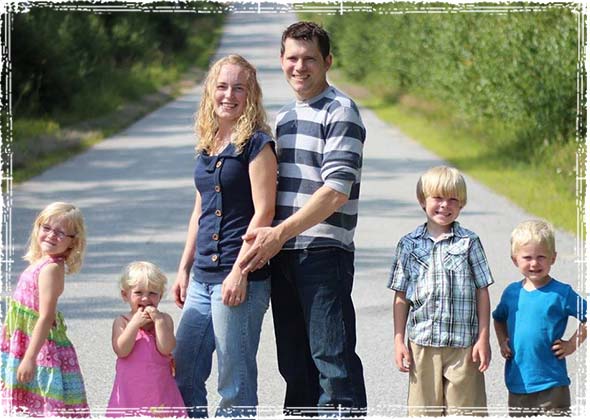
Can you tell us a little about yourself and your lifestyle?
I am a stay at home mom of four and my husband is a plant supervisor of one of the last wood production facilities in the state. We’ve been married for almost 11 years and our four children are eight, six, five, and three years old. Our oldest, Nemo, is an animated, thoughtful, inventive young man. Daphney, our second oldest, an aspiring artist despite her battle with strabismus, who loves the pretty things in life. Atlas, third in line, is our family’s problem solver; he’s always coming up with a witty way of solving everyday problems. Amelia, a.k.a. Baby Girl, easily keeps up with the rest of the herd and shares smiles with everyone. We’ve spent four years living in a bunkhouse camper through wild Maine winters and mild Maine summers.
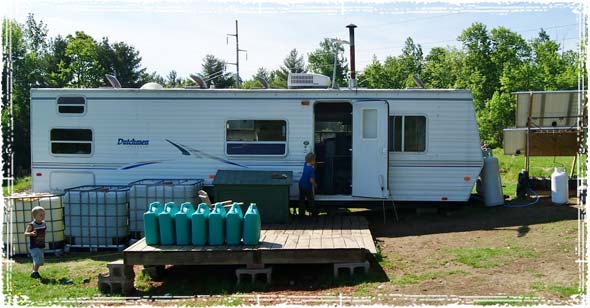
Can you share a little about why you chose to go off the grid?
Independence is our number one reason. The second reason is that it makes more financial sense, and third, it provides a cushion in case something icky should hit the fan, if you catch my drift! We also appreciate that living off -grid (and in a small home no less) forces us to simplify our lives.
How did you find your land, and do you have advice for those looking for rural or off-grid land?
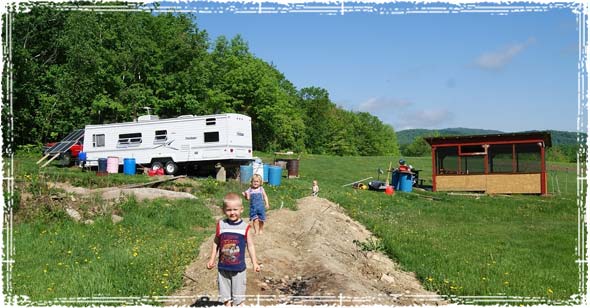
We were blessed with land from our family without having to front any monetary contributions. Our land is well-suited for what we are trying to accomplish for neo-homesteading. It is important when going off the grid to find land that is suitable for what your expectations are. For one, what kind of land is it? If it’s wooded, you’ll have to think about clearing out the trees. If it’s sand, it won’t be good for growing in. If it’s on a hillside, you may not get enough sunlight to manage solely off solar power. While shopping, consider how much you can afford, and how you can best use the land to fit your needs.
Can you tell me about your setup? How do you power your home, what do you do for water, heat, and communications?
For communication, we have cell phones, a Wi-Fi hot spot on one of the cell phones, with 4G highspeed internet. We don’t want to draw any illusions that we are hermits, because we are certainly not seclusionists; we have a lot of technology while living simply. My husband has recording equipment, which he uses to write and record music. Our kids are well versed in popular apps for the iPad (Minecraft being their favorite). I enjoy updating our family Facebook page and researching homeschool ideas. In a nutshell, we’re no different than anyone else when it comes to communication.
Because we live in Maine, heat is a necessity to at least some degree for 9 months of the year. We use a combination of a wick kerosene heater and a small tent wood stove, which we retrofitted into our camper. This radiant kerosene heater will provide moderate warmth on 20-50 degree days. Our wood stove will provide good heat down to about minus 10 degrees, and anytime the temperature drops below that we use both the kerosene heater and the wood stove at the same time.
Campers are designed with a relatively low water flow system. That enables us to use between 55 and 65 gallons a week for showers, dish washing, and consumption. We wash our laundry at the local laundromat. We pump water from our dug well during the spring thaw and save in multiple IBC totes, from which we draw from throughout the spring, summer, and fall. This water is first treated and then filtered before use, although we do not drink it. Drinking water is trucked in by 6-gallon totes from the parents’ tap. Collected rainwater is stored for the gardens and chickens.
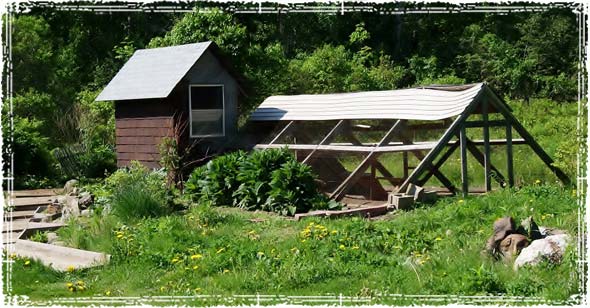
For power, we have six, 100 Watt solar panels and six deep-cycle batteries, along with a gas generator. We have a 450 Watt inverter that satisfies all of our typical daily needs (e.g. lights, cell phones, fans, TV, radio).
One main reason why we decided to purchase a camper to start our homesteading life is the fact that they run off of 12 volt DC power. A camper is designed to use 12 volt DC in conjunction with propane to run the stove, hot water heater, water pump, and refrigerator.
My husband reworked the RV’s electrical system so that the 12V battery bank supplies the RV’s DC appliance demands while also running the inverter which supplies the outlets with 120V AC. It is important to note that the RV’s AC to DC converter (battery charger) is disconnected from the breaker box so that the power from inverter does not try charging the batteries from which it draws from. That being said, when our battery charge is low we can plug the RV’s internal charger into the generator for charging, but our outlets AC is still derived from the inverter. This is not a typical off-grid solar system. We’re redneck and we buy what we need to make it work!

Another aspect to our off-grid systems is waste management. My husband removed the RV toilet and replaced it with a homemade composting toilet, made from a 5-gallon pail and a wooden box built around it with a toilet seat on top. He also built an outhouse, which we prefer to use during the day and avoid using in the dead of winter.
Do you have emergency backup plans in place for bad weather for those times when your system may not be enough?
Aside from a few wind storms each year, we don’t have much for severe weather to be concerned with. Our primary concern leading up to and during those storms is how well the camper will sustain high winds, so we have done our best to use ratcheting tie-downs to anchor it to the ground and provide extra resistance to the winds, which is working well so far! We also have neighbors and family nearby to help us if needed.
We talk a lot about preparedness on this site; how do you prepare for bad times with so little space? Are you able to stockpile extra supplies and food in case things go bad?

We have built a 12×8, two-story shed which houses the extra blankets, clothing, food, and survival gear that we can’t fit inside our camper. If we are expecting a period of bad weather, we try to stock up on extra fuel and water to get us by until it is over. During the winter we have to bring all seven of our six-gallon water containers into the camper to prevent freezing, and we store these in whatever nooks and crannies we can manage!
When it comes to food, are you completely self-sufficient?

No! Ha-ha, we have a long way to go before we can be completely self-sufficient. Our current priority is to limit dependency, keep expenses low, and maintain a comfortable living. We are also directing all spare funds to our house-building project, which we aim to complete by next fall. Once we have our house built it will be easier to reevaluate the balance between self-sufficiency and dependence on the system, and determine where our focus should be. Our long-term goal is to be 80 or more percent self-sufficient because we are concerned about the future of our country and see the need to be less reliant on others to meet our needs and protect our values.
What kind of challenges have you faced, and if you had to start over is there anything you would do differently this time?
You can do anything in hindsight, but everything in life is a learning experience, and the mistakes along with the successes are all part of the journey. For that reason, we wouldn’t change anything, even though some of our attempts at meeting our off grid needs have been less than successful, such as when the closed-in porch we built beside our camper blew over in a blizzard one winter.
What are some of the challenges associated with living in such a small place?
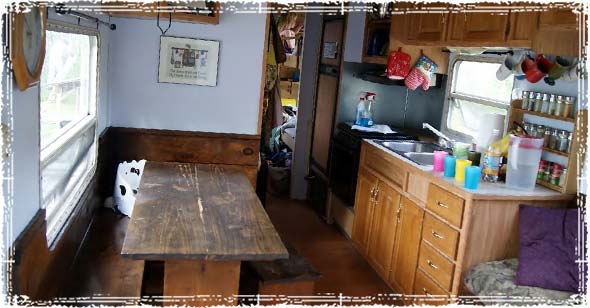
Cabin fever! Ha-ha. All joking aside, initially the transition to living in a small space required a change of mindset – we needed to adjust our expectations and our preconceived ideas of what makes a home. With some creativity we found a balance in minimalist living; learning how to use the space we have to be both useful and beautiful, for all six people living under this roof. We’ve made some relatively inexpensive renovations to make it meet our needs as well.
What do your children think about the lifestyle, and do you have any advice for parents who are thinking about doing something similar?
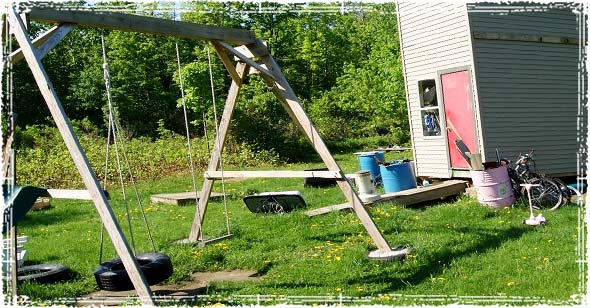
Well our oldest child dreams of purchasing a motor home at age 16 and traveling the country, so I guess he’s pretty happy with our lifestyle! Really, he is the only one of our kids that remembers much of our previous, larger home, and our youngest has only lived in our camper, having been born here three years ago! They look forward to having larger bedrooms in our future 800 square foot house, but they also seem content to build forts in their beds and then go romping in our large backyard to play. Having outdoor space has been very beneficial to our happiness, but we have learned more every year how to respect each other’s need for space inside, which is reflected in some of the renovations we’ve made.
Do you have any final words of advice for those looking to go off the grid? What should they expect, what can they do to prepare for the change in lifestyle?
When we began preparing for our adventure, I found it particularly encouraging to read blogs about other families who had already been living in small homes and/or off grid. My husband also drew on the experience of others through YouTube. We began eliminating excess belongings and consolidating what we wanted to keep, using less and less space in our home so we could transition more easily. We stocked up on solar equipment, gardening supplies, and survival gear. One of the concepts that helped me the most, as until shortly before the move I was completely unversed in off-grid living, was to realize that it could be done. We could do it; it was just a matter of figuring out the hows. Where there’s a will, there’s a way!
Naomi Kilbrethis is the author of the book A Year in a Camper: a family’s story of rediscovering the American dream.

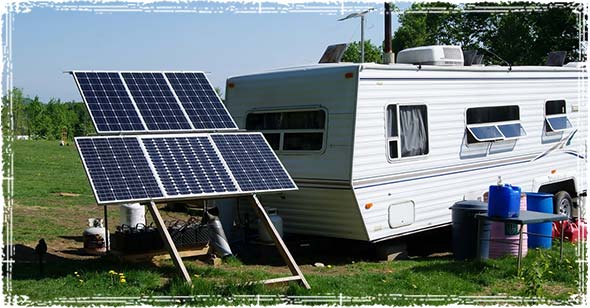
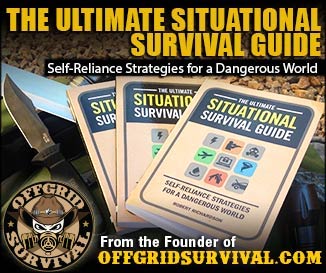
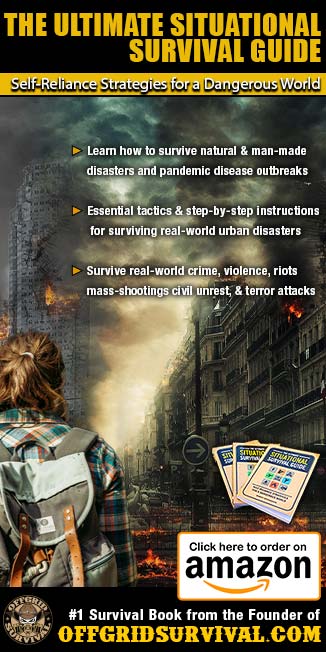

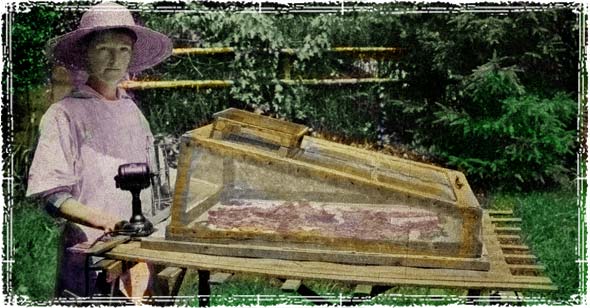

Very nice story! That’s exactly how I intend to live in 2 years from now, congratulations on such a great and healthy initiative! :o)
there are 1,000’s of people living in Vans, Small trucks & small fiberglass campers, The main thing is downsizing your life style. all of these are 12 volt DC, Add solar panel & a second battery for it’s system add a propane cook stove ,maybe even a small 3 way refrigerator, your all set up. No Reason most people can’t do this.i can do it.
Keebler.in the woods in southern,Va.
I’m in SW VA and find as I look for land to live off grid with rainwater and outhouse that the health department said if I live there I MUST have well water, then a septic system. what county are you in ?
When we started out,we were in a converted school bus,with 4 kids. We live in the north central mountains at almost 4,000 ft. I took hay bails and put them all around the base of the bus to keep the cold out . I had a bunch of 3in Styrofoam and I duct taped it to the sides and roof. We lived this way until we could afford to build our home. It gets 20 below at times, but with the wood stove I put in we were never cold. We are still living off grid,and it’s been over 20 years.
In Alabama we have been doing this for generations we call them mobile homes and when you don’t pay the electric bill you are very quickly “off Grid”…
very funny!
Thanks for making Alabamians look like a bunch of degenerates! Geez!
Touché! Roll Tide and War Eagle! I live in Tuscaloosa. Had very similar thoughts. Also thought that this lifestyle is not a choice for some people I know….it is just their way of life…the “old ways” are just the way they were raised and live. No generational gap or returning to the land. They’ve never left.
War Eagle! Ft McClellan MP Co. 1996-1997. Anniston is NOT missed. Cross Pistols… out
Being 60 and unemployed, I am converting a van for full time living. Having 400watt solar and propane, I plan to travel this country one last time not only to find some part time work but like minded people and maybe locate some raw land.
These houses are so cool. I love it. I think it’s a very viable way of living for a lot of people. I just have really one concern: safety. What about thunderstorms with heavy winds or tornadoes? Where do you go if the tornado alarms sound? What about crime? A tiny house would be almost defenseless out in the country where the cops are miles away and you are sitting in 14 x 14 box with a bear or a bad guy outside. I wouldn’t feel safe living in a tiny house..
does anyone else draw exception to the fact that people with electricity that dont pay their bill have their utility shut off till they pay. but if you try living off utilities people show up telling you it is forbidden? i dont know, just sounds like no one can figure it out to me. you cant have it both ways.
We are planning on building in Eastern WA, & plan to be totally off-grid. For what it costs to bring the grid to our home I can install solar, so I will. I have not found anything that says I “have” to connect to the grid. I will be following this web site for information, suggestions & ideas. Thanks. Bob
Blessings on you all and you have great fortitude and ingenuity. And I’m assuming that kerosene heater is vented to the outside. I’m grandma aged so of course that concerned me. :) And my heart goes out to your sweetie daughter with the strabismus. My 25-year-old daughter with an art degree struggled, too. But three surgeries and nine years of patching off and on (but mostly on), and glades, too, gave her a future and preserved her sight. Glad to see you guys aren’t so extreme that she isn’t getting the help she needs to keep the vision on that eye. That would be a terrible price to pay for off-grid living and she would be the one who paid it. Take care of yourselves and may God grant you wisdom, safety, and adventure!
“Glades” is glasses
I have fallen in love with this idea. Of building a home, with solar panels and recycled items. I really want to teach my kids how to survive and learn myself. But how much does this cost? Like I know you are saving money but I would like to purchase land with cash and not get into debt to banks. By having a house thats stability and a learning tool is something I am interested in.
Lovely story. I scanned the article a few times and couldn’t find the name of the Mama who was interviewed, so I’ll just call her MamaX4. Mama, I’d love an update about you and your family. How are the kids? How are you dealing with the adjustment to the limited space? Have you been able to build your sustainable home by now? I hope all is well with you all and would love an update on your adventure!
What a wonderful article ! My trailer I’m working on is in New Brunswick, just across the border from Maine, so I especially appreciated hearing about your heating solution.
Is there any chance you could share the other rennovations you did inside the trailer to make it more comfortable for you ?
I was also wondering if you might be able to share your plans, or pictures, for your 800 square foot house ? (Not blue prints, but a sketch on a napkin showing where you put the rooms would tell me a lot).
Looking at the dates, I think you must be in it already.